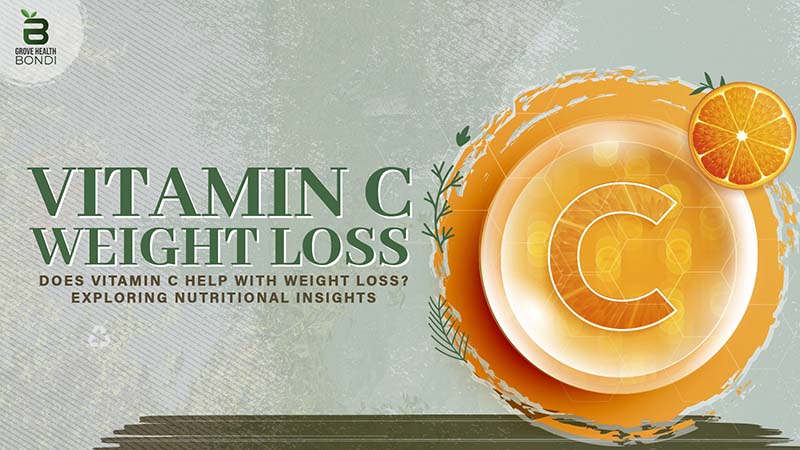In the quest for effective weight loss methods, many people have wondered, “Does Vitamin C help with weight loss?” Known for its ability to boost the immune system and improve skin health, Vitamin C may also play a significant role in supporting weight loss.
Research has shown that Vitamin C can enhance metabolism and aid in burning excess fat more efficiently. Additionally, Vitamin C supplementation helps the body absorb iron better, improving overall health and creating a strong foundation for healthy weight loss. So, can Vitamin C truly be a powerful ally in the battle against weight gain? Join Grove Health Bondi as we delve deeper into this topic in the following article.

1. Understanding the Benefits of Vitamin C for Weight Loss
Vitamin C contains very little energy, which not only boosts health but also aids in effective weight loss. Notably, a glass of fruit juice containing vitamin C has a very low calorie count, so you can drink it without worrying about excess energy and weight gain. Moreover, many studies show that vitamin C plays an important role in the body’s fat metabolism.

1.2 Vitamin C Efficiently Metabolizes Cholesterol
Vitamin C can help metabolize cholesterol by acting as a catalyst in the metabolic process and oxidizing excess fat tissues. Many studies have shown that vitamin C can effectively reduce cholesterol levels in the body by promoting metabolic processes in the liver, converting cholesterol into soluble substances in bile.
If the body lacks vitamin C, cholesterol levels in the liver and other parts will increase, leading to fat accumulation. Conversely, when sufficient vitamin C is provided, excess fat accumulation in organs is minimized. In short, vitamin C is a vital nutrient that helps the body maintain fat balance and ensures cardiovascular health.

1.2 Vitamin C Helps Burn Excess Fat
Vitamin C is known for its ability to promote the synthesis of carnitine, a special compound that significantly impacts the body’s fat stores. This allows vitamin C to help burn excess fat and prevent further accumulation in the body. As a result, you will achieve a firmer and leaner body. In summary, vitamin C is an essential nutrient that aids in effective weight loss and maintaining a healthy body.
1.3 Vitamin C Promotes the Use of More Fat by the Body
To lose weight effectively, physical activity is crucial. When exercising, the body uses energy from various sources, including fat, sugar, and high-energy compounds. However, if the body is not supplied with enough vitamin C, it will struggle to use fat as an energy source. On the other hand, if sufficient vitamin C is provided, the body will prioritize using fat as the energy source for activities.
In addition to supporting physical activity, vitamin C plays a crucial role in maintaining the body’s health and energy balance. Therefore, when participating in physical activities such as fitness training, supplementing with vitamin C along with a proper diet and exercise routine will help you achieve a healthy and lean body.

2. How to Use Vitamin C Effectively for Weight Loss?
Vitamin C is more commonly known for boosting immunity, but it also plays a significant role in weight loss. This essential nutrient aids in the metabolism of fat, an important factor when you’re trying to shed pounds. Here’s how you can incorporate Vitamin C into your weight loss regimen effectively:
2.1 Safe Ways to Use Vitamin C for Weight Loss
Consume more foods rich in vitamin C: These include vegetables like spinach, beet greens, jute leaves, malabar spinach, coriander, celery, Vietnamese coriander, and various fruits like guava, tangerines, ripe papaya, kumquats, oranges, and lemons. However, vitamin C is easily degraded at high temperatures, so be mindful during food preparation. Lightly boiled dishes retain more vitamin C than fried, sautéed, or stewed dishes. The best way to preserve vitamin C is to choose fresh food and consume it in juice or smoothie form. Be aware that when foods are stored in the refrigerator, their vitamin C content decreases.
Vitamin C is acidic, so it should not be taken on an empty stomach or before meals as it may cause irritation. It is best to take vitamin C with a fat-rich meal to support effective weight loss. If using vitamin C supplements, take them in the morning and afternoon or 30 minutes before exercise.
Do not exceed 1000 mg of vitamin C daily as it can accumulate and cause digestive disorders. To absorb vitamin C best, divide the dose into several smaller doses throughout the day, ranging from 60 – 100mg each time. This ensures almost complete absorption. However, higher doses result in lower absorption.
It is important to combine vitamin C intake with a balanced diet and physical activity. To provide the body with essential nutrients and vitamins, in addition to vitamin C, ensure the intake of other nutrients like calcium, magnesium, vitamin A, and vitamin B. Enhance physical activities like walking, cycling, and yoga for optimal results.

2.2 How Long Does It Take for Vitamin C to Aid in Weight Loss?
While vitamin C can help with weight loss, do not expect rapid results within a few days. Using vitamin C for weight loss requires persistence over several months for the best results. The effectiveness of vitamin C in weight loss varies from person to person and depends on factors such as body type, initial weight, diet, and exercise regimen. However, excessive or high-dose vitamin C intake can cause unwanted side effects.
According to experts, the daily requirement of vitamin C for the human body is about 80 mg – 90 mg. This is the amount necessary for good health and well-being. To use vitamin C for weight loss, you need to supplement the body with an amount four times the regular requirement. Therefore, to lose weight effectively, you need to supplement approximately 320mg – 360mg of vitamin C daily.

3. Who Can Use Vitamin C for Weight Loss?
Here are the individuals who can and should not use vitamin C for weight loss:
Can use:
- People who are deficient in vitamin C.
- Individuals who are obese or overweight and wish to lose weight and improve their physique.
- Both men and women can use vitamin C.
Should not use:
- Individuals with high blood pressure, especially avoiding effervescent vitamin C.
- People with urinary stones or a history of this condition.
- Those with kidney disease should not use vitamin C as it can increase urinary oxalate, leading to kidney stones.
4. Conclusion
In conclusion, the question “Does Vitamin C help with weight loss?” is one that warrants serious consideration. The evidence suggests that Vitamin C can indeed play a supportive role in weight management. Its ability to boost metabolism, enhance fat burning, and improve iron absorption are all factors that contribute to a healthier, more efficient weight loss process.
Additionally, the overall health benefits of Vitamin C, such as boosting the immune system and improving skin health, make it a valuable nutrient in any diet. While Vitamin C alone is not a magic bullet for weight loss, incorporating it into a balanced diet and healthy lifestyle can certainly aid in achieving weight loss goals. So, if you’re looking to enhance your weight loss journey, don’t underestimate the potential benefits of Vitamin C.

